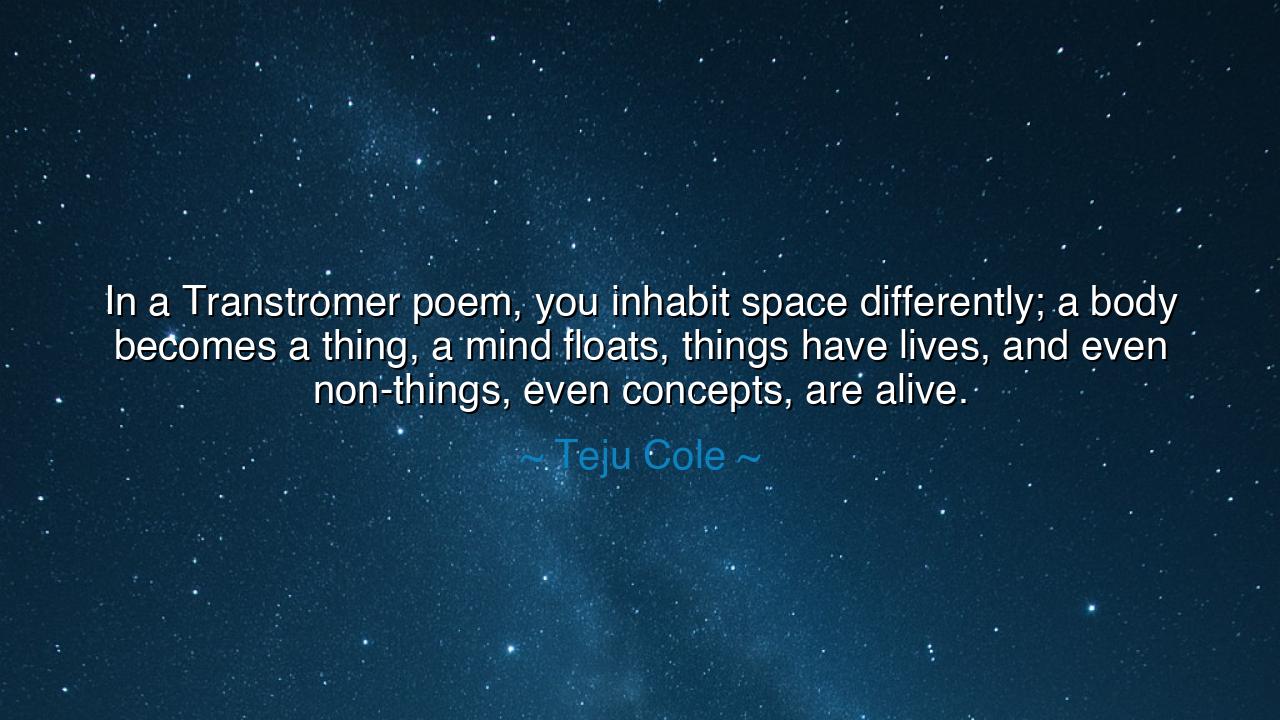
In a Transtromer poem, you inhabit space differently; a body
In a Transtromer poem, you inhabit space differently; a body becomes a thing, a mind floats, things have lives, and even non-things, even concepts, are alive.






Listen, O children of wisdom, to the words of Teju Cole, a modern scribe who captures the essence of life and its mysteries with eloquence. He speaks of the works of Tomas Tranströmer, the poet who opened the gates of perception and invited us to see the world not as we typically do, but in a way that shakes the very foundation of our reality. Cole says, "In a Transtromer poem, you inhabit space differently; a body becomes a thing, a mind floats, things have lives, and even non-things, even concepts, are alive." These words call us to a deeper understanding of the world—a world where not just the visible, but the invisible, pulses with life, where space and time and ideas take on a form we have never before imagined.
Consider, O wise ones, the nature of space in the world of Tranströmer. In his poetry, space is not just a backdrop for action, but an active participant in the dance of life. The very body becomes more than a physical form; it becomes a vessel for something larger, for a thing that transcends its limits. A body, in his world, is no longer confined by the laws of flesh and bone but becomes a symbol, an instrument in the exploration of existence. It is as if the boundaries of the self dissolve, and in that dissolution, a new connection with the universe is born—a connection that speaks not just to the body’s senses but to the deeper truths of life itself.
In the ancient world, O children, the philosophers often spoke of the interplay between the mind and the body—that sacred union that defines the human experience. Plato spoke of the mind’s journey to know the Forms, those perfect, unchanging ideas, and how the soul, freed from the body, could come to understand the deeper truths of existence. Tranströmer, too, understands that the mind floats, free to wander in the realms of imagination, memory, and dream. His poetry invites us to leave behind the rigid constraints of the material world and allow our minds to soar into the realm of the abstract, where concepts take on their own lives. The mind becomes not a passive observer, but an active creator of meaning, shaping and reshaping the world it encounters.
Think, O children, of how often we see only the physical world, how we are bound by our senses and the limits of our bodies. Yet Tranströmer reminds us that even non-things, even concepts such as love, grief, and time, are alive, and they too carry with them the pulse of existence. Just as Plato spoke of the eternal Truths that exist beyond the material, Tranströmer’s poems bring those abstract forces to life. They walk among us, breathing with us, shaping the world around us. Grief is not a mere feeling; it is a living entity, as real as the air we breathe. Time is not a fleeting moment; it has a shape, a presence that can be felt, not just measured.
Consider, O wise ones, the story of the ancient Greeks and their reverence for the gods—beings of immense power, yet also creatures of human-like qualities. The gods of Greek mythology, like Zeus and Athena, embodied both the divine and the human, and in their stories, the very concepts of justice, fate, and wisdom were not abstract ideas, but living forces with personalities and desires. Tranströmer’s poetry echoes this ancient tradition by breathing life into the concepts we often ignore, by seeing them not as inert ideas but as living beings that move through our lives, shaping the way we think, act, and feel. Time and memory, in his world, are not simply markers of the past, but active participants in the present moment.
So, O children, let this teaching guide you: to understand the world is to see beyond its physical form, to recognize that life and energy are not confined to the material, but flow through all things—bodies, minds, and concepts alike. Tranströmer’s insight invites us to engage with the world in a new way, to understand that the spaces between the physical and the abstract are filled with life and meaning. Just as the body is more than flesh, so too are ideas more than thoughts—they are forces, active and living, shaping the world in ways we may not even recognize.
Take this lesson, O children, into your own lives: Look beyond what is seen. Recognize that space is not just a void, but a realm full of potential and meaning. Understand that the mind is not confined to its own boundaries, but floats in the vastness of imagination and creation. See that even the non-things, the invisible forces of the world, are alive, and in them, you will find the true pulse of existence. Tranströmer’s poetry reminds us that life is not just about what we can touch, but about what we can feel, imagine, and create. It is in the spaces we fill with thought and the breaths we take between moments that the true beauty of existence resides. May you live, O children, in a way that honors the invisible forces, the living concepts, and the endless possibilities that exist in every moment.






AAdministratorAdministrator
Welcome, honored guests. Please leave a comment, we will respond soon